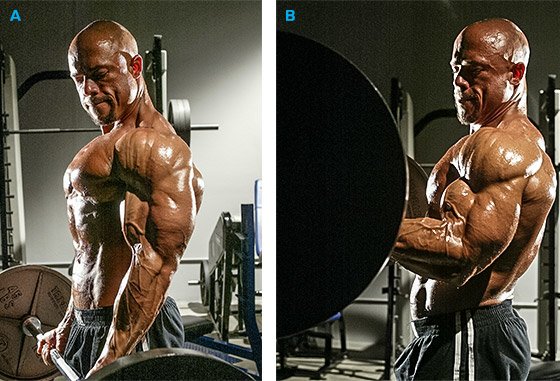When you're a beginning or intermediate lifter, it can seem like everything works—at least for a while. You change rep schemes or programs, and you grow. You change your diet, and you grow. You try a new supplement, and you grow.
But eventually, if you keep living the lifestyle and working hard, you'll find that you're no longer just lifting—you're bodybuilding. Unfortunately, this is when growing actually gets harder. On one hand, you know what you're doing, and maybe you're even considering competing. But on the other, you've also achieved enough of your potential that further improvements are hard to come by.
Welcome to the realm of advanced lifting—for better and worse!
When you get to this point, the rules of the game have to change if you want to keep moving forward. You need to stop worrying about what everyone else is doing, and confidently forge your own path.
Want to know where to start? Here are six hard truths that advanced lifters need to take to heart if they want to keep progressing without limits!
1
Execution Matters As Much As Form
Speaking out against form may sound like weightlifting blasphemy, but give me a chance. The difference between form and execution is that when many people focus solely on form, they often become preoccupied with how a exercise looks, rather than how effective it is for what they are trying to achieve. If you want to know what I mean, go look at videos of the world's top bodybuilders training, from Arnold on down the line. Often, they break the rules of "good form" without fear, and at least one of the comments under the video attempt to call them out for a "terrible squat/bench/deadlift/pull-down."

But guess what? Elite bodybuilders don't care what you think of their form! They know that execution means making sure the right muscle group is targeted and stimulated properly. They know exactly how make a movement benefit them most in the pursuit of their goals. Maybe it means their back isn't quite as rigid as the textbook says. Or maybe the angle of their elbows needs to be a little more pronounced in order for them to stimulate their shoulders.
Once you've built a strong foundation with good form, this is OK! It's how you maintain proper focus and keep moving on to the next level, and the next one after that.
2
The negative as important as the positive
It's easy to become so mentally focused on lifting a weight that we neglect one of the most powerful parts of the exercise: the negative portion. There are a number of reasons why we do it. It's much easier to control a weight on the positive movement, and it's also how we track the amount we lift. After all, it's called weightlifting, not weight-lowering, right?
But here's the thing: Maintaining precise control of the negative half of a movement stimulates your muscles so dramatically that it's essential for elite muscular development. When you put forth that burst of power on the positive side of the move, you shorten the muscle. When you go back to reset, you elongate it. There's plenty of science showing exactly why it's effective, but the main takeaway is that it is. You can't ever get to the next level without learning to control this movement.

Barbell Curl
There are many opinions about how best to control the negative movement of an exercise. Some are extreme and call for controlling the negative movement for four whole seconds, while others just say to give it two seconds. In my Mass Machine Training Program, I suggest a one-count on the concentric or positive part of the movement, and a two-count on the eccentric or negative. The basic idea is to do it half as fast as the positive movement.
Whatever your training style, I advise you to concentrate on controlling the weight during that part of the moment. Try timing it, even if you don't use the precise timing I suggest. This will help you to begin focusing on the rhythm, which is crucial to keeping the weight controlled once you get tired.
3
You need to track everything

Tracking your progress is absolutely essential to next-level training. There's no room for just winging it.
By tracking your progress, I'm not talking about just writing down that you benched 225 during your last set—although simply doing that puts you far ahead of the majority of people in the gym. Who really cares about that? It's just mere record keeping. The real question is how you use that information to propel you to higher and higher levels in the future.
I'm talking about having a journal, app, or spreadsheet where you can record what you did the last time you worked out, how you felt, how you arranged your nutrition around your workout, and other information that will help you predict trends and achieve ambitious goals systematically.
Tracking your progress allows you to set goals for each workout based on what you know you've done, not based on how you feel at that moment or what you think you can do today. Your feelings are unreliable indicators of what you are capable of achieving. Numbers give you a far more accurate picture.
I found that simply knowing you have to write your results down after your set makes you work that much harder. You become more accountable to yourself. In life, accountability plays a huge role in even the hardest-working people's performance. If you know that you'll have to write down that you benched 20 pounds less or did fewer reps than last time, that's often enough to make you push through to a better workout. This is where you start making real progress, because you always set your own bar a little higher.
4
You must be results-driven

A lot of people become complacent when they find a workout program and a diet that everyone at the gym or on the Internet approves of. It might be a great program or diet, but there's so much more that goes into getting next-level results. Your mental focus, emotional control, understanding of your body, and execution of your plan matter far more than numbers on the page or screen.
Instead of letting the process drive you, be results-driven. When you're focused on the results, you make sure you do the exercises properly, that you understand your program and your body, and that you give them both everything you have. You use all of your physical, mental, emotional, and psychological powers to find ways to make the program work even better. Because, trust me, there is always a way to take whatever program you are using to a higher level.
Remember: Wherever you're going, it's not the program that will take you there. It will be you.
5
Too much advice is a bad thing
When something is important to us, we typically want to get feedback on our goals and how we're going about achieving them. We want assurance that we're doing things right and advice on how to reach higher. This is normal. But once you reach an advanced level, you need to be selective about who you seek advice from. You also need to learn how to trust your own ideas and intuition.
Only ask for advice from someone you respect, who has your same goals, passion, and desire, not some watered-down version of them. If you want to be a champion bodybuilder, for example, don't go to an auto mechanic who causally trains three days per week to get his advice on gearing up for your next contest.

That may sound like an unlikely example, but believe me: There will always be people with no experience or passion who will nevertheless gladly tell you the "right" way to do things. Instead, go to someone who has your best interests at heart, who understands what you're doing and why, and who can give you real insight based on experience.
One of the worst things you can do is post your diet or training routine on the Internet somewhere and ask everyone what they think. I already know what they will think: half will love it, and half will hate it. And most of those who love it will still offer up suggestions on how to improve it. But do any of them know what they're talking about? Meanwhile, you're more confused than before you posted it.
6
You must always review your workouts
We talked earlier about tracking your progress, but tracking is only half the process. You also need to review what you track. One of the most important ways you can train your mindset is by examining your workouts religiously after completing them. This doesn't have to be a long process, but it does have to be a consistent one.

When I say "review," I mean something specific: Sit down for just a minute or two and review how you performed. Did you fall short of your goals or expectations? What can you do better next time? What new strategy or technique worked for you today? You want to stop bad practices before they become unconscious, bad habits and reinforce the things you do well so they become unconscious, good habits.
Like the other truths here, this doesn't demand much time, thought, or extra planning. It just needs to take root in your head, so you can follow through automatically and make it part of your mindset moving forward. Constantly evolving and constantly learning—that's what makes the next level comes into view.
Recommended For You

Press To Impress: Take Your Pressing Movements To A Higher Level
Classic muscle-building lifts won't serve you if you're letting the weight drag you around like a rag doll. Get control of the situation and earn the mass you've been craving!
Raise Your Standards: 6 Next-Level
Build a more successful workout foundation before your training starts! Follow these tips, and enter the gym feeling ready for battle!

